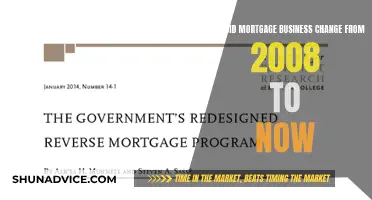
Prepaying your mortgage can be a great way to speed up your journey to debt-free homeownership. However, it is not a one-size-fits-all solution. Prepayment essentially means paying off your loan early, which can save you money on interest. However, it requires extra funds, and there may be penalties involved. There are several methods for prepaying a mortgage, and it's important to consider your current financial situation before deciding to prepay.
| Characteristics | Values |
|---|---|
| Definition | Prepaying a mortgage means paying off your loan early |
| Components | Principal, interest, taxes and insurance (PITI) |
| Pros | Paying less interest over time, accelerating the reduction of principal, paying off the loan faster, saving money on interest |
| Cons | Prepayment penalty, limited funds for other expenses, missing out on investment opportunities with potentially higher returns |
| Prepayment penalty | A fee some lenders charge when you pay all or part of your loan off early |
| Prepayment penalty costs | Vary depending on the lender and the loan |
| Prepayment penalty types | Soft prepayment penalty, hard prepayment penalty |
| Prepayment methods | One extra payment each year, switching to biweekly payments, additional principal-only payments, mortgage recast |
What You'll Learn

Prepayment penalties
There are two types of prepayment penalties: soft and hard. A soft prepayment penalty applies in fewer situations than a hard prepayment penalty. A soft penalty is usually triggered when a borrower refinances their loan or pays off a large chunk of their mortgage within a calendar year. A hard prepayment penalty can be triggered by several situations, including refinancing, paying off a significant portion of the loan, or selling a home. If a borrower makes a few extra payments or pays a little extra each month, it usually won't trigger a prepayment penalty. However, if the extra payments amount to more than 20% of the loan balance in a year, the penalty may be applied.
The cost of prepayment penalties varies depending on the lender and the loan. Some common models used to determine the penalty cost include:
- A percentage of the remaining loan balance, such as 2% of the outstanding principal if paid off within the first 2 or 3 years of the loan term.
- A lender-specified number of months' interest, such as 6 months.
- A fixed amount, which is typically not used for mortgages, but could be a flat fee for paying off a loan within the first year.
- A sliding scale based on the mortgage length, which is the most common model.
Guild Mortgage: A Giant in the Industry
You may want to see also

Pros and cons of prepayment
Prepaying a mortgage means paying off your loan before the term ends. This can be done by making larger monthly payments or a lump-sum payment. While prepayment can help you save money on interest and speed up your path to debt-free homeownership, there are several factors to consider before deciding to prepay your mortgage. Here are some pros and cons of prepayment to help you make an informed decision:
Pros of Prepayment:
- Reduced interest payments: By prepaying your mortgage, you can save money on interest costs. In the early years of a mortgage, a significant percentage of your payment goes towards interest, with a small fraction reducing the principal balance. Prepaying your mortgage accelerates the reduction of the principal, allowing you to pay off your loan sooner and reduce the total interest paid over the life of the loan.
- Faster path to debt-free homeownership: Prepaying your mortgage can help you become a debt-free homeowner sooner. By making additional principal-only payments or lump-sum payments, you can significantly reduce your mortgage balance and shorten the loan term.
- Increased equity: Prepaying your mortgage can help you build equity in your home faster. By paying off your principal loan earlier, you increase your ownership stake in your home.
Cons of Prepayment:
- Prepayment penalty: Some mortgages have a "prepayment penalty," where lenders charge a fee if the loan is paid in full before the term ends. This penalty could offset any savings gained from paying off the loan early. It is important to review your loan terms and closing disclosure to check for any prepayment penalties.
- Limited funds for other investments: Making larger monthly payments towards your mortgage may result in limited funds for other expenses or investment opportunities. You could potentially earn a higher rate of return by investing in the stock market, retirement savings accounts, or other ventures.
- Other debts and financial priorities: Before prepaying your mortgage, consider other high-interest debts, such as credit cards, that may have higher interest rates than your mortgage. It is generally recommended to pay off these debts first. Additionally, ensure that you have an adequate emergency fund and are on track with your retirement savings before allocating extra funds towards prepaying your mortgage.
It is important to carefully consider your current financial situation, including your savings, investments, and other debts, before deciding to prepay your mortgage. Prepayment may not be the best option for everyone, and it is essential to weigh the pros and cons to make a decision that aligns with your financial goals and priorities.
Notarizing Mortgage Documents: The California Notary's Role
You may want to see also

Prepayment methods
Regular Monthly Prepayments: This approach involves making small, incremental prepayments each month in addition to your regular mortgage payment. For example, if your monthly mortgage payment is $477.42, you could round it up to $500 or add an extra $50. This method can help you reduce your mortgage term and save on interest costs.
Bi-Weekly Payments: By paying half of your monthly payment every two weeks, you will make the equivalent of 13 full payments a year, resulting in one extra payment. This strategy can be an effective way to reduce your mortgage term and save on interest.
Lump-Sum Payments: If you receive a windfall, such as a bonus or inheritance, you can make a large payment toward the principal of your loan. This option may be suitable if you want to reduce your loan term significantly and have the financial means to do so.
Mortgage Recast: With this option, you make a large payment toward the principal and then work with your lender to recalculate your monthly payments based on the new, lower balance. This can lower your monthly payments while also reducing the loan term.
It is important to note that some mortgages have prepayment penalties, which are fees charged by lenders when you pay off your loan early. Be sure to review your loan terms and consider your financial situation before choosing a prepayment method. Additionally, focus on building an emergency fund and ensuring you have adequate retirement savings before allocating extra funds towards prepaying your mortgage.
Why Mortgages Aren't Current Liabilities for Businesses
You may want to see also

How prepayment works
Prepaying a mortgage means paying off your loan before the end of its term. Typically, when you pay your mortgage, you pay a fixed amount each month, with a portion of that payment going towards the principal and a portion covering the interest. When you prepay your mortgage, you pay extra towards the loan principal, helping to pay off your loan sooner and save money on interest.
There are several ways to prepay a mortgage, including through biweekly payments, periodic extra payments, or a lump sum. One common method is to make one extra payment each year. This can be done by dividing your monthly payment by 12 and adding that amount to each monthly payment. For example, if your monthly mortgage payment is $2,000, you could add $200 to each monthly payment. This strategy can save you thousands over time.
Another option is to switch to biweekly payments, where you pay half of your monthly payment every two weeks, resulting in 13 full payments a year, which is equivalent to one extra payment. You can also make additional principal-only payments whenever you have extra funds, such as a bonus or tax refund. These lump-sum payments can significantly reduce your mortgage balance.
Before deciding to prepay your mortgage, it's important to consider your current financial situation. Ensure you have an adequate emergency fund and are saving enough for retirement. Additionally, review your loan terms to see if there are any prepayment penalties, as some mortgages charge a fee for early repayment.
When you make an extra payment on your mortgage, that money goes directly towards reducing the balance of your loan. This triggers a cascade effect that speeds up the repayment of the loan. As your outstanding balance decreases, your future interest payments will also be lower, further reducing the overall cost of your loan.
US Mortgage Debt: A Growing Concern for Americans
You may want to see also

Prepayment and investment
One important consideration is the concept of opportunity cost, which refers to the potential benefits forgone by choosing one investment option over another. By prepaying your mortgage, you may limit your funds available for other investments with potentially higher returns. For example, investing in the stock market or a retirement savings account could offer greater benefits over time. Additionally, some mortgages carry a "prepayment penalty," where lenders charge a fee if the loan is fully paid before the term ends, which could offset any savings from early repayment.
On the other hand, prepaying your mortgage can have its advantages. By making additional payments towards the principal, you can reduce the total amount of interest paid over time. This can be particularly beneficial if you have a high-interest mortgage or if you're close to paying off your loan, as it can accelerate your path to debt-free homeownership. Before deciding to prepay, it's crucial to assess your financial situation and ensure you have adequate emergency savings and retirement funds.
Another factor to consider is the potential tax implications of prepaying your mortgage. The interest paid on a mortgage loan is often tax-deductible, whereas investing the same amount of money elsewhere may incur taxes on any income generated. Therefore, it's essential to understand the tax consequences of both prepayment and alternative investments.
In conclusion, the decision to prepay your mortgage or invest elsewhere depends on various factors, including opportunity cost, tax implications, and your financial goals and situation. It's important to carefully weigh the pros and cons of each option before making a decision. Consulting with a financial advisor can provide personalized guidance based on your specific circumstances.
ARM Mortgages: Are They Still Popular?
You may want to see also
Frequently asked questions
Mortgage prepayment is when you pay off your loan before the end of its term. This can be done by making larger monthly payments or a one-time lump-sum payment.
Mortgage prepayment can help you save money on interest and pay off your loan faster. It can also reduce the total amount you pay towards your mortgage.
Some lenders charge a prepayment penalty, which is a fee for paying off your loan early. This can vary depending on the lender and the loan. However, most borrowers are not subject to a prepayment penalty.







